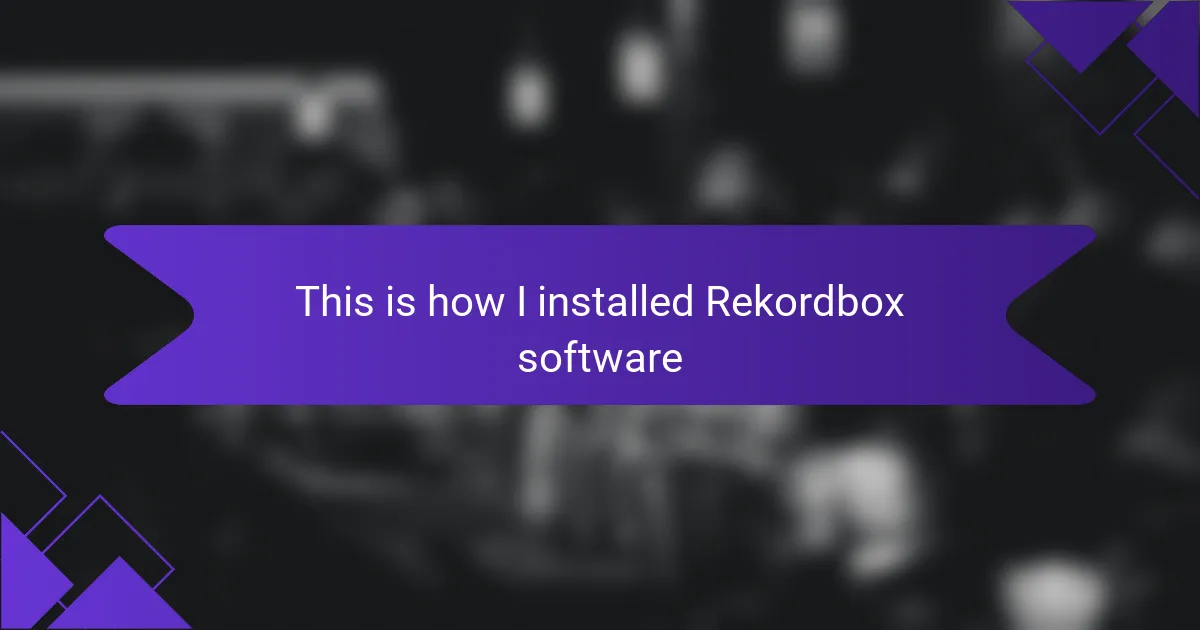Key takeaways
- Organizing DJ gear enhances performance, reduces stress, and improves efficiency during gigs.
- Common organization methods include labeling items for quick access and using storage bins for protection.
- Maintaining DJ equipment through regular cleaning and checking connections prevents potential damage and ensures reliability.
- Categorizing gear by functionality simplifies setup and improves readiness for performances.
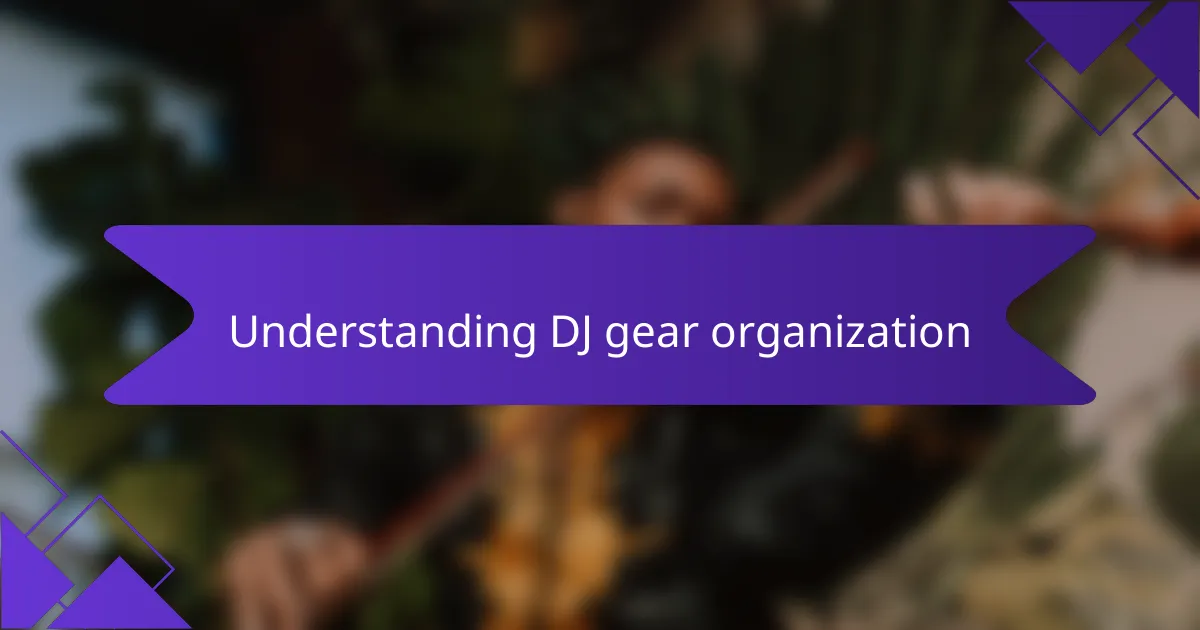
Understanding DJ gear organization
Understanding how to organize your DJ gear is essential for anyone looking to enhance their performance. I’ve learned from experience that a well-organized setup can drastically reduce stress and improve efficiency during gigs. For instance, I used to scramble to find cables and connectors until I invested time in categorizing everything. It became a game-changer for me!
When I set out to organize my gear, I focused on creating a system that was both functional and easy to navigate. This not only saved me time but also helped me feel more confident before taking the stage. The peace of mind that comes from knowing where everything is located allows for a more enjoyable experience, which, in my opinion, is priceless.
Here’s a quick comparison of two common organization methods I’ve tried:
| Method | Pros/Cons |
|---|---|
| Labeling Items | Pros: Easy to find things quickly; Helps keep track of smaller items. Cons: Labels can wear off over time. |
| Using Storage Bins | Pros: Keeps gear protected; Aesthetically pleasing. Cons: May require more space; Can be cumbersome to carry around. |
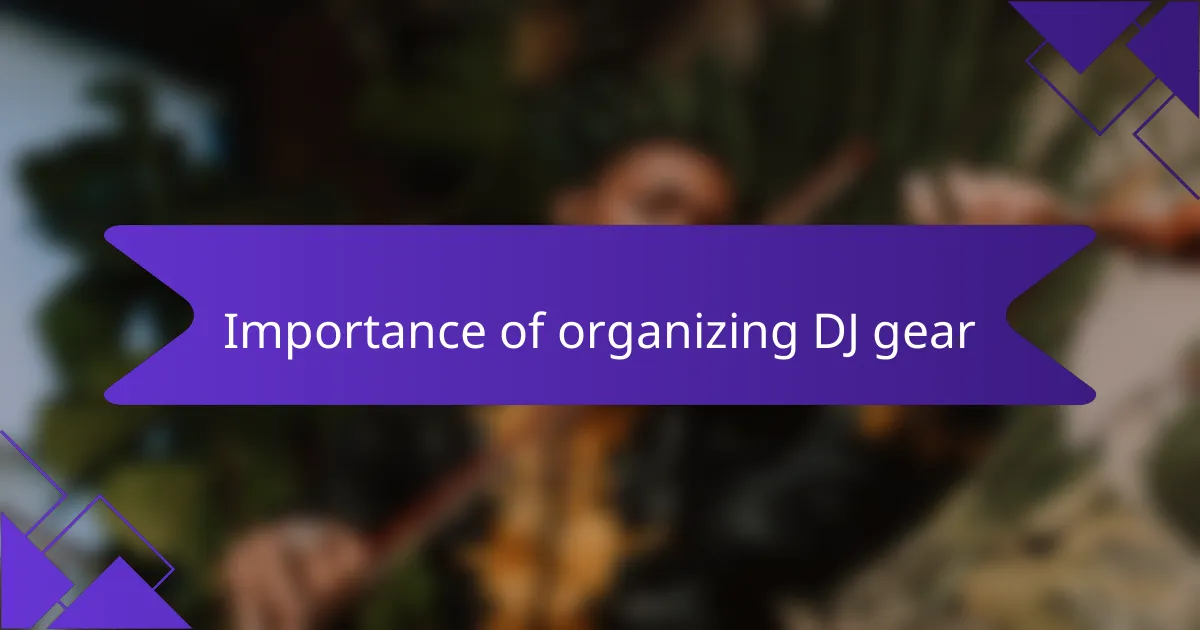
Importance of organizing DJ gear
Organizing DJ gear is essential for any DJ, whether you’re a beginner or a seasoned pro. I remember those early gigs when I spent more time searching for my headphones than actually setting up. With everything in its place, you can focus on what truly matters: the music and connecting with your audience.
Having a clear system not only saves time but also prevents potential damage to your equipment. I’ve seen friends lose valuable gear simply because they didn’t take the time to organize. Taking pride in how you care for your equipment reflects on your professionalism and passion for the craft.
When you know where everything is, you can prepare your sets much more efficiently and reduce stress. After all, a well-organized setup allows for a smooth flow during performances, helping you shine under the spotlight without unnecessary distractions.
| Aspect | Organized Gear | Unorganized Gear |
|---|---|---|
| Setup Time | Minimal | Excessive |
| Equipment Damage | Low Risk | High Risk |
| Focus Level | High | Low |
| Professional Image | Strong | Weak |
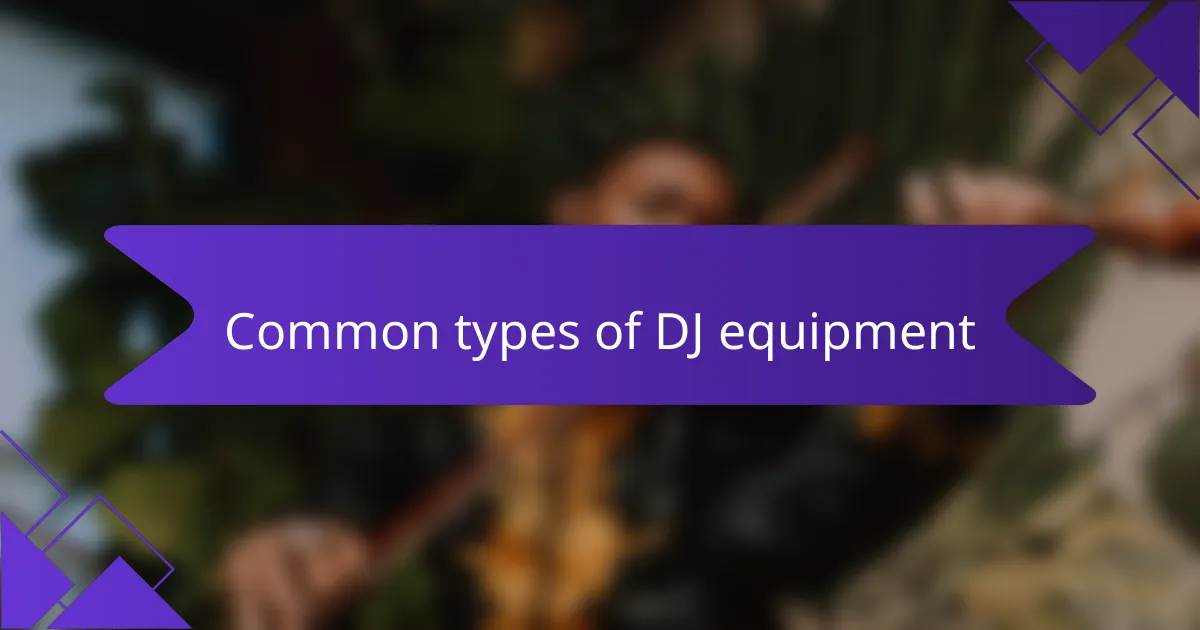
Common types of DJ equipment
When it comes to DJ equipment, a few essential items form the backbone of any setup. I remember my first gig, which wouldn’t have been possible without my reliable turntables. These not only allow for precise mixing but also provide the tactile feedback that many DJs crave. The connection between your fingers and the vinyl is something truly special.
Mixers play a crucial role too. I’ve often found myself experimenting with different models to find the perfect fit for my style. A good mixer allows you to blend tracks seamlessly and adjust levels on the fly, enhancing the flow of the performance. Have you ever felt the adrenaline rush when you nail that perfect transition? That’s what a quality mixer can do for you.
Of course, we can’t overlook sound systems and speakers. I’ve learned that investing in decent speakers is a game-changer; they ensure that every beat resonates with the audience. The energy in the room transforms when the sound is right. It’s not just about playing music; it’s about creating an atmosphere where everyone can let loose and enjoy the night.

Best storage solutions for DJ gear
When it comes to organizing my DJ gear, finding the right storage solutions has been a game changer. I’ve experimented with various setups, and I’ve found that using dedicated gear cases not only keeps my equipment safe but also makes it easy to transport to gigs. I have a hard-shell case for my controller, which I absolutely love, as it protects my equipment from bumps and drops—trust me, I’ve learned that the hard way!
Another solution I’ve found effective is shelving units in my studio space. This allows me to neatly display my gear while keeping everything easily accessible. It’s kind of like a mini-gallery for my passion! I also make it a point to label everything; that helps when I’m in a rush before a show.
Here’s a quick comparison of some popular storage solutions I’ve often considered:
| Storage Solution | Pros |
|---|---|
| Gear Cases | Durable, portable, and protective |
| Shelving Units | Accessible, customizable, and good for display |
| Backpacks | Lightweight, portable, and perfect for quick gigs |
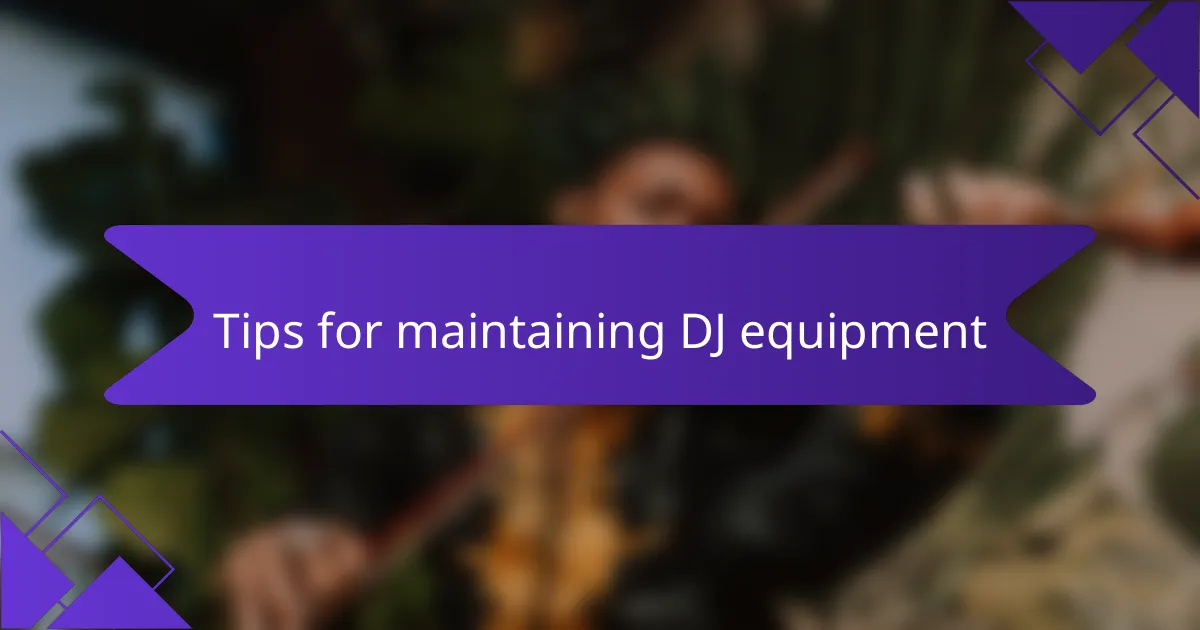
Tips for maintaining DJ equipment
Maintaining DJ equipment is as crucial as organizing it. I always make sure to clean my gear after every gig. Dust and grime can build up quickly, and a simple wipe down can extend the life of your equipment. Have you ever noticed how a little maintenance can make your mixers and turntables perform like new? I certainly have!
One of my go-to tips is to regularly check all connections and cables for wear and tear. I remember a show where I lost sound mid-set because of a frayed cable. It’s a lesson I learned the hard way! Now, I inspect my gear meticulously, especially before a big event, which gives me peace of mind and confidence on stage.
Lastly, investing in protective cases and bags can make a world of difference. I keep my headphones and controllers in padded cases to prevent damage when transporting them. Trust me; nothing feels worse than arriving at a gig only to find your equipment isn’t in tip-top shape! How do you protect your gear? It’s a small effort that can save a lot of heartbreak later on.

How I categorized my gear
When I organized my DJ gear, I started by categorizing everything into distinct groups based on functionality. This approach not only simplified my setup but also made it easier to find the gear I needed during gigs. For instance, all audio interfaces and mixers went into one category, while controllers and turntables took another spot—this way, I could visualize my entire arsenal quickly.
I also paid attention to the storage spaces, using clear bins for small accessories like cables and adapters. This not only kept things tidy but also helped me feel more prepared, knowing that I had everything at my fingertips. It’s surprising how a little bit of organization can reduce the stress before a performance!
Here’s a quick comparison of how I categorized my gear:
| Category | Items Included |
|---|---|
| Audio Interfaces & Mixers | Focusrite, Pioneer DJM, Behringer |
| Controllers | Reloop Terminal Mix 8, Numark Mixtrack Pro |
| Turntables | Technics SL-1200, Numark PT01 |
| Cables & Accessories | XLR, RCA, Power Cables |


